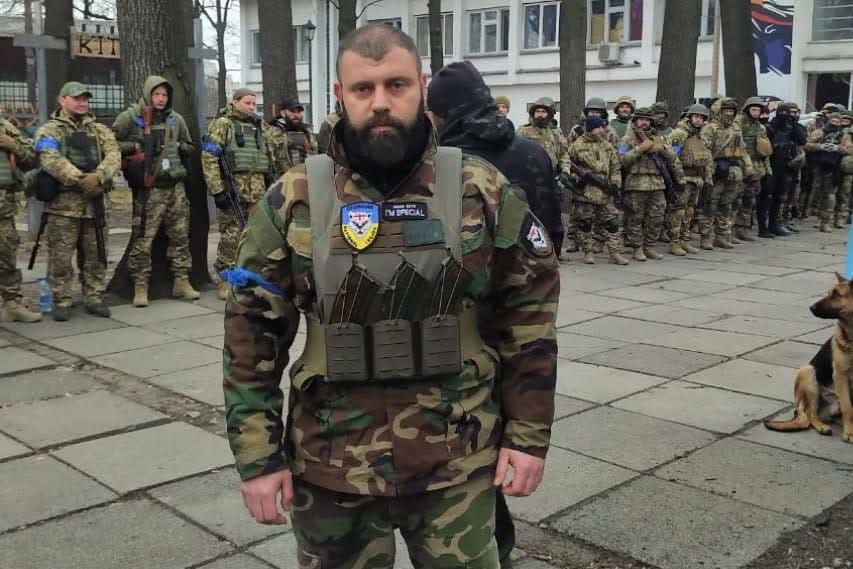
The chair of Georgia’s ruling party, along with other leading party members, has threatened to strip Georgians fighting against Russia in Ukraine of their citizenship.
Speaking to journalists on Thursday, Irakli Kobakhidze stated that any Georgian national who joined the armed forces of another country would lose their Georgian citizenship.
‘If anyone leaves Georgia and enrols, for instance, in the armed forces of Ukraine, it follows that they become a citizen of Ukraine’, he said.
Kobakhidze also attempted to ‘draw a red line’ between Georgians in Ukraine fighting ‘with enthusiasm and for the idea’ from those he said were there ‘in exchange for money’.
‘I hope and I want to believe that all 34 [Georgian fighters killed in Ukraine] fought for the idea’, Kobakhidze said.
While Kobakhidze expressed surprise that journalists raised the citizenship issue, it was the leader of his parliamentary group, Mamuka Mdinaradze, who first raised the possibility earlier that day, insisting it would be done ‘automatically’.
Article 21 of the Law of Georgia on Georgian Citizenship states that a citizen who ‘joins military, police, or security services of a foreign country without the permission of competent Georgian authorities’ would lose their Georgian citizenship.
However, according to the Public Defender, Nino Lomjaria, loss of citizenship would not be automatic. She said it would require a state body to appeal to the Public Service Development Agency to strip someone of their Georgian passport.
The party subsequently tried to backtrack, arguing that these statements were meant to ‘warn’ Georgian volunteers of a legal reality, something they said their recruiters were not doing.
Government critics, including almost all opposition groups in Georgia, decried the comments, calling them a part of a campaign to discredit Georgian combatants in Ukraine by questioning their motives and warning them their Georgian citizenship may be in jeopardy.
Mamuka Mamulashvili, the commander of the Georgian Legion, condemned the ruling party for threatening their Georgian citizenship, while rejecting the suggestion they were motivated by material gains.
Several other Georgian volunteer fighters in Ukraine also spoke out. ‘This is a direct threat. They cannot intimidate us with this’, Romeo Parulava told TV channel Formula.
‘Immoral populism’
Kobakhidze’s threat came as Georgian Dream faces mounting pressure over their attitude towards Georgians fighting in Ukraine.
After reports emerged on 3 December that five Georgian fighters had been killed in one day in the battle for the city of Bakhmut, the government received harsh criticism for their lack of response, including ignoring calls to announce a day of mourning.
Following several days of silence, on 5 December, Prime Minister Irakli Gharibashvili offered his condolences to the loved ones of the fallen fighters, only to rebuke what he called the ‘radical opposition’ and ‘party of war and traitors’ for recruiting the fighters in Ukraine — seemingly referring to the formerly ruling United National Movement (UNM) party.
Gharibashvili accused them of engaging in ‘immoral populism’ over this issue in attacking him, and of continuous efforts to ‘open second front of war’ with Russia in Georgia.
Following public backlash, on 7 December, Gharibashvili accused the media of misreporting his remarks and argued that only ‘specific volunteers’ like Georgian Legion commander Mamuka Mamulashvili, were involved in commercial recruiting. He also said Mamulashvili was affiliated with the UNM.

Hours after Gharibashvili clarified his earlier remarks, pro-government TV channel PosTV reported that they had ‘exposed’ the Georgian Legion, which has been integrated into Ukraine’s armed forces since 2016, for offering $2,000 to recruits.
Coincidentally, in December 2014, during his first tenure as PM, Gharibashvili scolded the then–Georgian Defence Minister for making ‘politicised’ statements over Georgian fighters in Ukraine.
The Defence Ministry had released a statement following the death of Georgian citizen Aleskandre Grigolashvili in Luhansk condemning the UNM for encouraging Georgians to fight in Ukraine.
Power generators and a ‘city of peace’
The Georgian Government has been accused by critics of failing to support Ukraine adequately, or of outright support for Russia since Russia launched its full-scale invasion in February. Days after Putin announced the beginning of the war, the Georgian government stopped a charter flight sent by the Ukrainian government to pick up Georgian volunteers from Tbilisi airport, leading to the first in a series of public spats between the two countries.

On 9 November, PM Gharibashvili said Georgia would procure electricity generators to donate to Ukraine. The promise came three days after Andrii Kasianov, Ukraine’s Charge d’Affaires in Georgia, complained that they had received no response to a plea for the generators from Georgia for a month.
While dismissing criticism over the generators as a ‘fuss’, Gharibashvili did not specify the type or the number of generators Georgia would send, nor did he explain the reported late response.
Amidst crippling drone and missile strikes on Ukraine’s power infrastructure by Russia, the Ukrainian government have sought help from abroad to deal with power interruptions.
Before Gharibashvili announced the donation on Friday, many Georgians had joined the Share the Light campaign launched in late November to buy and send power generators to Ukraine. The group said on Friday that they had raised over ₾300,000 ($114,000).
Georgian Dream also came under fire after party Secretary General and Tbilisi Mayor Kakha Kaladze refused to revisit his choice of ‘City of Peace’ as the New Year’s Eve slogan for the capital.
Critics have said the slogan is inappropriate given the ongoing war in Ukraine. Georgian officials have seemingly confirmed the slogan was chosen in response to what they have claimed is an attempt to drag Georgia into the war.
In response, opposition group Droa attached/hanged black ribbons on the fences in front of the City of Peace sign on Liberty Square in Tbilisi, something Georgian Dream’s Irakli Kobakhidze described as a ‘dirty provocation’.
Critics, including the Talgha (‘wave’) anti-government group, plan to protest the lighting of the city’s New Year Tree by Kaladze on Friday evening.









